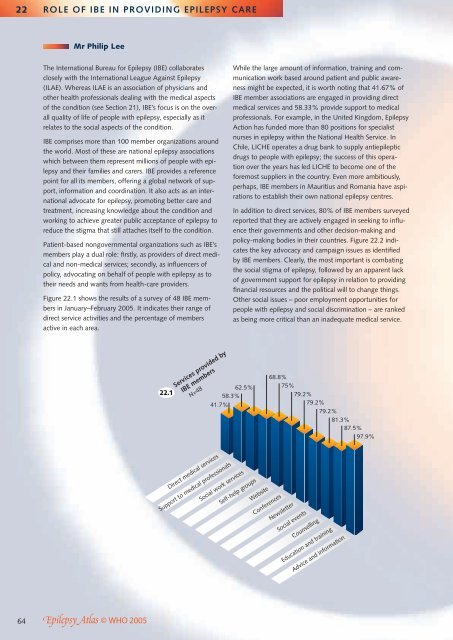Epilepsy - World Health Organization
Epilepsy - World Health Organization
Epilepsy - World Health Organization
Create successful ePaper yourself
Turn your PDF publications into a flip-book with our unique Google optimized e-Paper software.
22 ROLE OF IBE IN PROVIDING EPILEPSY CARE<br />
64<br />
Mr Philip Lee<br />
The International Bureau for <strong>Epilepsy</strong> (IBE) collaborates<br />
closely with the International League Against <strong>Epilepsy</strong><br />
(ILAE). Whereas ILAE is an association of physicians and<br />
other health professionals dealing with the medical aspects<br />
of the condition (see Section 21), IBE’s focus is on the overall<br />
quality of life of people with epilepsy, especially as it<br />
relates to the social aspects of the condition.<br />
IBE comprises more than 100 member organizations around<br />
the world. Most of these are national epilepsy associations<br />
which between them represent millions of people with epilepsy<br />
and their families and carers. IBE provides a reference<br />
point for all its members, offering a global network of support,<br />
information and coordination. It also acts as an international<br />
advocate for epilepsy, promoting better care and<br />
treatment, increasing knowledge about the condition and<br />
working to achieve greater public acceptance of epilepsy to<br />
reduce the stigma that still attaches itself to the condition.<br />
Patient-based nongovernmental organizations such as IBE’s<br />
members play a dual role: firstly, as providers of direct medical<br />
and non-medical services; secondly, as influencers of<br />
policy, advocating on behalf of people with epilepsy as to<br />
their needs and wants from health-care providers.<br />
Figure 22.1 shows the results of a survey of 48 IBE members<br />
in January–February 2005. It indicates their range of<br />
direct service activities and the percentage of members<br />
active in each area.<br />
22.1<br />
Services provided by<br />
IBE members<br />
N=48<br />
Direct medical services<br />
While the large amount of information, training and communication<br />
work based around patient and public awareness<br />
might be expected, it is worth noting that 41.67% of<br />
IBE member associations are engaged in providing direct<br />
medical services and 58.33% provide support to medical<br />
professionals. For example, in the United Kingdom, <strong>Epilepsy</strong><br />
Action has funded more than 80 positions for specialist<br />
nurses in epilepsy within the National <strong>Health</strong> Service. In<br />
Chile, LICHE operates a drug bank to supply antiepileptic<br />
drugs to people with epilepsy; the success of this operation<br />
over the years has led LICHE to become one of the<br />
foremost suppliers in the country. Even more ambitiously,<br />
perhaps, IBE members in Mauritius and Romania have aspirations<br />
to establish their own national epilepsy centres.<br />
In addition to direct services, 80% of IBE members surveyed<br />
reported that they are actively engaged in seeking to influence<br />
their governments and other decision-making and<br />
policy-making bodies in their countries. Figure 22.2 indicates<br />
the key advocacy and campaign issues as identified<br />
by IBE members. Clearly, the most important is combating<br />
the social stigma of epilepsy, followed by an apparent lack<br />
of government support for epilepsy in relation to providing<br />
financial resources and the political will to change things.<br />
Other social issues – poor employment opportunities for<br />
people with epilepsy and social discrimination – are ranked<br />
as being more critical than an inadequate medical service.<br />
62.5%<br />
58.3%<br />
41.7%<br />
Social work services<br />
Support to medical professionals<br />
Self-help groups<br />
Website<br />
Conferences<br />
68.8%<br />
75%<br />
79.2%<br />
79.2%<br />
79.2%<br />
81.3%<br />
87.5%<br />
97.9%<br />
Newsletter<br />
Social events<br />
Counselling<br />
Education and training<br />
Advice and information

















